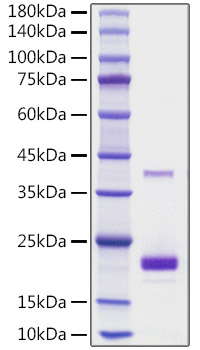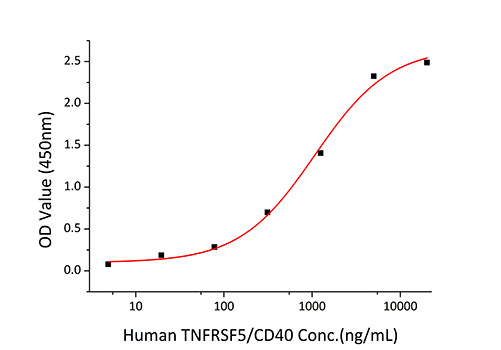Description
Recombinant Mouse TNFSF5/CD40 ligand/CD154 Protein
The Recombinant Mouse TNFSF5/CD40 ligand/CD154 Protein is a high-quality recombinant protein designed for murine biological research applications. This protein serves as an essential reagent in mouse model studies, comparative immunology research, and preclinical therapeutic evaluations, enabling scientists to investigate TNFSF5/CD40 ligand/CD154 biology and its relevance to human disease mechanisms through translational research approaches.
This product (SKU: RPCB1341) is produced using HEK293 cells and features a N-6His tag for convenient detection and purification. The protein exhibits a calculated molecular weight of 16.83 kDa with an observed molecular weight of 19-22 kDa under denaturing conditions, achieving ≥ 95 % as determined by SDS-PAGE.. Functional bioactivity has been validated through rigorous quality control assays, confirming its suitability for demanding research applications.
Key Features
| High Purity by Affinity Chromatography | |
| Mammalian & Bacterial Expression Systems | |
| High lot-to-lot consistency via strict QC |
| Product Name: | Recombinant Mouse TNFSF5/CD40 ligand/CD154 Protein |
| SKU: | RPCB1341 |
| Size: | 10 μg , 20 μg , 50 μg , 100 μg |
| Reactivity: | Mouse |
| Synonyms: | IGM, IMD3, Ly62, TRAP, gp39, CD154, Cd40l, HIGM1, Ly-62, T-BAM, CD40-L, Tnfsf5, Tnlg8b, CD40LG |
| Tag: | N-6His |
| Expression Host: | HEK293 cells |
| Calculated MW: | 16.83 kDa |
| Observed MW: | 19-22 kDa |
| Gene ID: | 21947 |
| Protein Description: | High quality, high purity and low endotoxin recombinant Recombinant Mouse TNFSF5/CD40 ligand/CD154 Protein (RPCB1341), tested reactivity in HEK293 cells and has been validated in SDS-PAGE.100% guaranteed. |
| Endotoxin: | < 0.1 EU/μg of the protein by LAL method. |
| Purity: | ≥ 95 % as determined by SDS-PAGE. |
| Formulation: | Lyophilized from a 0.22 μm filtered solution of PBS, pH 7.4. |
| Bio-Activity: | Measured by its binding ability in a functional ELISA.Immobilized Mouse CD40L (RPCB1341) at 5 μg/mL (100 μL/well) can bind Human CD40 (RPCB0821) with a linear range of 0.005-1 μg/mL. |
| Reconstitution: | Centrifuge the vial before opening. Reconstitute to a concentration of 0.1-0.5 mg/mL in sterile distilled water. Avoid vortex or vigorously pipetting the protein. For long term storage, it is recommended to add a carrier protein or stablizer (e.g. 0.1% BSA, 5% HSA, 10% FBS or 5% Trehalose), and aliquot the reconstituted protein solution to minimize free-thaw cycles. |
| Storage: | Store at -20℃.Store the lyophilized protein at -20℃ to -80 ℃ up to 1 year from the date of receipt. After reconstitution, the protein solution is stable at -20℃ for 3 months, at 2-8℃ for up to 1 week. |
CD154, also known as CD40 ligand or CD40L, is a member of the TNF superfamily. While CD154 was originally found on T cell surface, its expression has since been found on a wide variety of cells, including platelets, mast cells, macrophages and NK cells. CD154's ability is achieved through binding to the CD40 on antigen-presenting cells (APC). In the macrophage cells, the primary signal for activation is IFN-γ from Th1 type CD4 T cells. The secondary signal is CD40L on the T cell, which interacting with the CD40 molecules, helping increase the level of activation.








